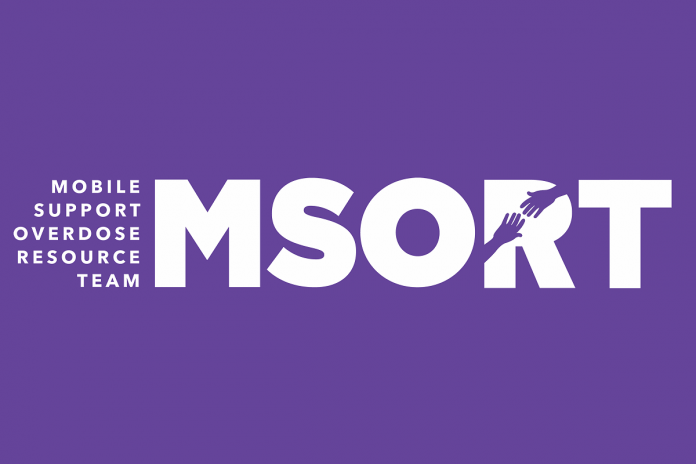
Trust is easy to lose but not so easy to earn. As the prerequisite for the relationships that members of Peterborough’s Mobile Support Overdose Resource Team (MSORT) have established with substance users, trust is paramount.
In fact, it’s the basis of the first few baby steps on the way to changing and possibly saving lives.
Comprised of three intensive case managers, a harm reduction specialist, and a paramedic, MSORT reaches out to and interacts with substance users on their turf, the goal being to reduce the adverse and potentially tragic physical, mental, and emotional health impacts of a poisoned drug supply.
Some team members bring to that mission something that is key in the trust equation: lived experience.
“They have a different understanding of what’s happening to an individual and can offer services that won’t stigmatize,” explains Jessica Penner, coordinator with the Peterborough Drug Strategy.
“A well-meaning individual who is a service provider might not necessarily understand how they’re stigmatizing an individual. It’s not possible to quantify the value of being able to talk the talk, to speak to people on the same page.”
Fourcast executive director Donna Rogers concurs, saying those with lived experience “understand things at a different level.”
She adds it’s rare to come across people in a helping profession who don’t have lived experience, “particularly those that do street level work like this, whether it’s their own or that of a family member or friend. The further we go down the path of not resolving the opioid crisis, it’s tougher to find people who haven’t been personally impacted.”
Because the poisoned drug supply crisis and all the issues around that aren’t going to be resolved at any point soon, initiatives like MSORT have a place to live and breathe and do their important work.
A collaborative pilot project that serves in Peterborough city and county, MSORT’s intent is to reduce overdoses and minimize the risk of harms related to overdose and substance use, especially opioids. Rogers explains the roots of its formation go back some five years.
“Acting (Peterborough) police chief Tim Farquharson had been to a conference and identified this street outreach model that had peers attached to it,” Rogers explains. “He believed it had lots of merit for our community. Peter Williams was the (police’s) community development person at the time. He was tasked with looking for opportunities to get something like this funded. I was one of the people who had input back then, but there were others — public health, CMHA … all of the usual suspects.”

So it was that an application for funding, submitted by the Peterborough Police Service, was made to Health Canada’s Substance Use and Addictions Program. It proved successful, resulting in 30 months of funding. While the police service received the funding as the applicant, it hasn’t kept a cent, ensuring that Fourcast and Peterborough Paramedics have the dollars needed to operate MSORT.
MSORT uses the Consumption and Treatment Services site at Simcoe and Aylmer streets as its home base, but it is primarily an outreach service. Ideally, it would do its work seven days a week round the clock but, to stretch its funding, the team operates five days a week from 8:30 a.m. to 4:30 p.m.
According to Fourcast-affiliated MSORT program manager Sonya Trotter, establishing trust with substance users was the first hill that had to be climbed.
“(MSORT paramedic) Audrey would go out in the community and people wouldn’t have anything to do with her,” Trotter recalls. “Her uniform spoke to a system that our clients aren’t interested in. They don’t have trust because there are a lot of barriers. They experience stigma and discrimination — they don’t want any part of that.”
Building that trust took a while, according to Trotter, but was critical to understanding the needs of substance users.
“Once you earn trust, they will allow you in to hear their stories, what they’re experiencing, and what they need to make change in their lives.”
Earning that trust means lives have been changed in a very big way, according to Rogers. From May to August of this year, two people who MSORT interacted with went into a residential addictions treatment.
“That doesn’t sound like a lot, but to get two people stable enough to be able to make that decision and go into treatment is massive,” Rogers says.
In addition, 10 people were housed via supportive housing programs, 17 were connected to the safer supply initiative, and 33 were connected to community treatment supports. Another four, notes Rogers, applied to One City’s employment program.
With MSORT now connecting daily with 20 to 25 people at any point of time, trust has clearly been established.
“We can’t quantify how many people haven’t died because of MSORT, but we can quantify the number of lives that been changed,” says Penner.
“If we didn’t have some of these really positive outcomes, this would be even more difficult work than it already is,” Rogers adds.
One challenge faced by an outreach program like MSORT is connected to the homelessness of many of those it serves.
“Every week, the city takes down tents and moves people along,” Trotter says. “It’s an ongoing issue. When we’re engaging people and we know where they are, that’s one thing. But the next time we go to that space, they’re gone. Sometimes we don’t find them for a couple of days.”
“What happens is they continue to destabilize. That makes it really difficult to implement a stabilization plan for them and move forward. We have a lack of housing. Getting somebody housed and stabilized is an ongoing task.”
When it comes to meeting this challenge and the many others MSORT faces, Rogers is heartened by the tenacity displayed by those on the team.
“They’re a very skilled, compassionate group,” she says. “They are really good folks. They are extraordinary professionals. From Sonya’s leadership right through to all of the experience on the team, if someone needs something, these guys know how to go after it and get it.”
The tenacity of the MSORT team is an important part of delivering on the trust they have earned with substance users.
“System navigation isn’t about ‘I know of three places that I can make a referral for you.’ It’s about ‘I’m going to get that appointment nailed down. I’m going to get you the option to do it. If you say yes, I will move three mountains to make sure that you can get there.'”
Still, it’s a work in progress that hangs by the slimmest of threads. On March 31, 2023, MSORT’s funding comes to an end.
Rogers says Health Canada has been approached for an extension — the Substance Use and Addictions Program can fund programs for up to five years — but, as of this writing, there was no word. She adds if confirmation of extended funding isn’t received, MSORT will be forced to wind down its operation, most likely early in the new year.
“From an efficiency of resources perspective, it’s beyond ridiculous to not have a plan for how you maintain successful programs,” Penner points out. “What kind of system does that? ‘Great job. OK, wrap it up.’ This isn’t going away. It’s not like we solved the opioid crisis.”


























